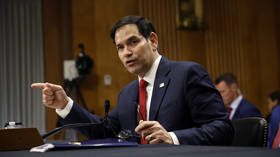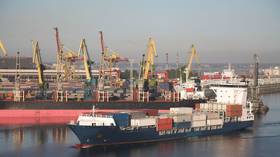Russia begins SLOWING DOWN Twitter over child porn, suicide & drug-use claims as regulator warns it could BLOCK service altogether

Twitter users in Russia are about to find it takes longer to share their thoughts online, as authorities start slowing the service's connection speeds amid a row over illegal content hosted by the US-based social media giant.
Communications regulator Roskomnadzor issued a statement on Wednesday morning announcing the decision, which it says is because Twitter “does not remove content that incites minors to commit suicide, contains child pornography or information about the use of drugs.”
The watchdog claims it has sent more than 28,000 requests for posts, links and publications to be deleted or blocked on the platform. However, at present, “3,168 pieces of content containing prohibited information… remain not deleted.” These reportedly include more than 2,500 calls for children to kill themselves and 450 involving child pornography.
Also on rt.com ‘They’re bugs & we will crush them!’ Putin issues fiery warning about activists & criminals taking advantage of children onlineAccusing the network of failing to adhere to Russian laws, Roskomnadzor said that “the latest vivid example was the demonstrative disregard for the requirements of the regulator to remove calls to minors to commit mass suicide.” Unlike other social networks, officials claim, “Twitter did not delete the materials.”
If the company continues to refuse to comply with the requests, Moscow says, “these measures will continue in line with regulations, up to the point of blocking” the service.
Anton Gorelkin, a member of the Russian Parliament's information policy committee said that the assembly supported the move, and that “it is a pity that Russian users have become hostages to decisions by Twitter.” But, justifying the slowdown, he said, “the state simply has no other tools to influence the violator.” Senator Alexander Bashkin added that other social media sites should take notice, claiming that “this will act as a wake up call for YouTube and other networks that make gains at the expense of law and order in Russia.”
Last week, Russian President Vladimir Putin warned that social media sites are being used “to promote completely unacceptable content: for the distribution of child pornography, prostitution, for driving minors to suicide.” He called for tough action on those using the internet to “try to take advantage of children in cold blood [in order to] achieve their own selfish, ‘ferret' goals.”
At the same time, he also singled out organizers of political rallies, such as those held in support of jailed opposition figure Alexey Navalny. Kremlin press secretary Dmitry Peskov later clarified that the president “was talking about those who call on children to take to the streets, breaking the law, and to participate in uncoordinated, unauthorized actions… he was talking about those who are engaged in criminal activity.”
Also on rt.com Russia planning tough measures against ‘lawless’ social media giants, after Facebook bans ‘fact-checked’ Neo-Nazi arrest reportsEarlier this month, the head of Russia's Investigative Committee, Alexander Bastrykin, ordered a probe into a series of social media posts that reportedly encouraged child suicide. According to detectives, videos were being shared promoting harmful and unsafe actions. The requests to ban content come after a new law came into force across Russia at the start of February, requiring networking giants to crack down on posts deemed harmful.
On Tuesday, a number of senior Russian parliamentarians also slammed Facebook for perceived censorship of news outlets after StopFake, a controversial Western-funded fact-checking service based in Ukraine, claimed it had found inaccuracies in media coverage. This led to posts from a number of mainstream Russian newspapers being pulled from the platform.
The Chairman of Russia's national parliament, Vyacheslav Volodin, issued a statement claiming that “this decision from Facebook violates the fundamental rights and freedoms of citizens, like the right to disseminate and receive information.” He added that “This is not the first time this has happened on the part of Facebook – Instagram and Twitter have done the same previously. I think this is unacceptable.”
Leonid Slutsky, the chairman of the parliamentary committee on International Affairs, also slammed the California-based tech giant's policies. “Blocking Facebook posts from a number of Russian media outlets … compiled on the basis of official press releases from the FSB and the Investigative Committee, is the most severe form of censorship and bias.”
Think your friends would be interested? Share this story!














